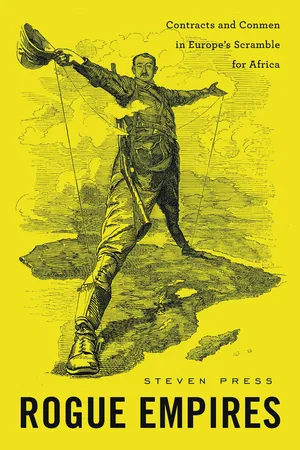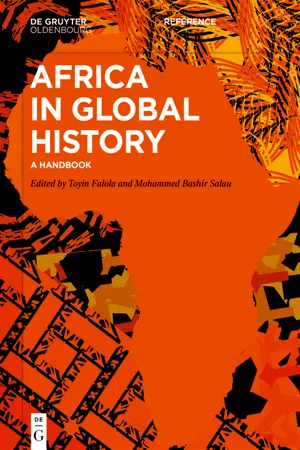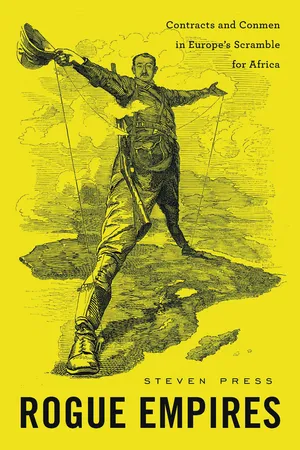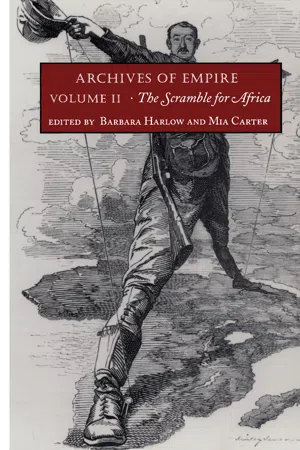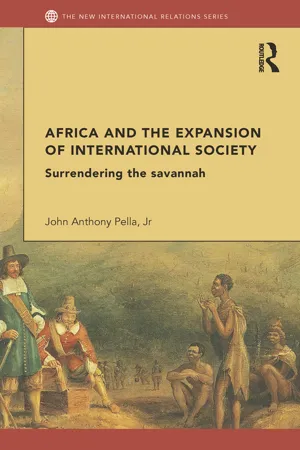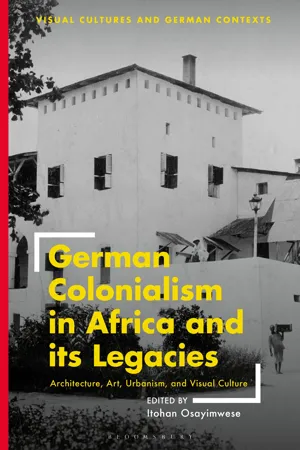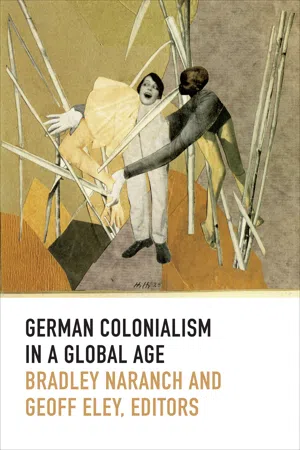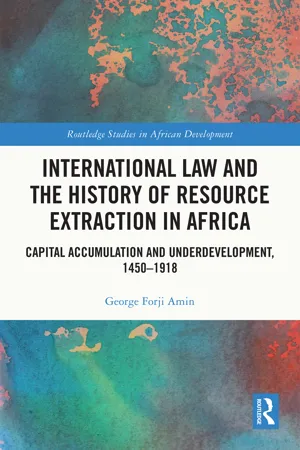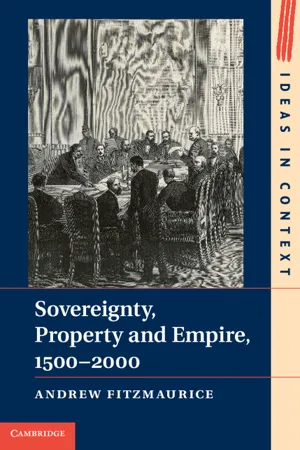Geography
Berlin Conference
The Berlin Conference was a meeting held in 1884-1885 where European powers established rules for the colonization and division of Africa. The conference aimed to prevent conflicts between European nations over African territories and to regulate trade and navigation along the Congo River. The decisions made at the conference had a significant impact on the subsequent colonization and exploitation of Africa.
Written by Perlego with AI-assistance
Related key terms
1 of 5
11 Key excerpts on "Berlin Conference"
- eBook - ePub
Rogue Empires
Contracts and Conmen in Europe’s Scramble for Africa
- Steven Press(Author)
- 2017(Publication Date)
- Harvard University Press(Publisher)
317 In truth, though, the gathering was an odd hybrid.On the one hand, it was understood by its participants, in the moment, as certain to have “far reaching effects” and to become “one of the most important [events] in history.”318 The conference, so predicted the German crown princess, was to arrange Africa’s future.319 And, to be sure, some attendees did just that, as when Woermann, on behalf of Germany, unilaterally negotiated with the Spanish delegate to accept certain wild Spanish claims to rule along the Río Campo, in exchange for Madrid’s compliance with German claims opposite the Bight of Biafra.320 On the other hand, the conference only addressed certain parts of Africa, and its official agenda did not so much authorize new colonization as approve colonization that had already gotten underway. Besides, far from orchestrating grand designs with precision, its participants looked downright unorganized. They hastily crammed information in the lead-up to the opening.321 Thereafter, they met only in afternoons, only for a few hours at a time, and only at irregular intervals, with notifications of postponements frequently arriving at delegates’ hotel rooms the evening before an appointment.322 Of these last instances, perhaps the most egregious derived from the British ambassador’s failure to decipher his telegraphic instructions in time for a scheduled session.323 Compounding such time troubles, most delegates at the conference felt cramped for space. They lacked typewriters and had to rely on their respective embassies in Berlin for logistical support just to record everything under discussion at meetings.324 Even the hall they met in looked overcrowded: For much of December, it housed a towering Christmas tree and gifts in addition to the horseshoe-shaped conference table.325 - eBook - ePub
Africa in Global History
A Handbook
- Toyin Falola, Mohammed Bashir Salau, Toyin Falola, Mohammed Bashir Salau(Authors)
- 2021(Publication Date)
- De Gruyter Oldenbourg(Publisher)
7 However, the conference in many ways put the nail in the coffin with regard to the final colonization of Africa. Many scholars suggest that by 1884, the continent was already firmly under European control, and the conference sought to prevent European powers from fighting among themselves over their possessions in Africa. In other words, the representatives at the Berlin Conference were laying in print the partitioning of Africa to avoid political crisis in Europe. Since there was no African representation, the European powers had assumed their conquest as a fait accompli.The conference ended with a treaty known as the Berlin Act, which set forth the rules of engagement to complete colonial occupation. One of the rules specified that treaties signed with African rulers were to be considered as legitimate titles, meaning that the European power could claim authority over the designated space. Another resolution from the conference specified that when any European power laid claim to any part of the continent, that power should inform other signatory powers. This was essential, as it removed the possibility of the European powers clashing over the same geographical space. Also instrumental was the declaration of effective occupation. This rule, by all measures, meant that conquest would be followed by settlement. In other words, Europeans would assume responsibility in the physical management of these territories. An equally important outcome of the conference was the point that each European power could extend its coastal possessions inland to a certain extent and claim spheres of influence. Hence, the European powers made the extraction of the continent’s resources easier from territories that were far from navigable waters. It should be noted that by this time navigable waters were the highways of transportation. Added to these proclamations was the freedom of navigation on the Congo and Niger Rivers. With this rule, European powers settled among themselves ways and means of keeping the African continent as a source of wealth extraction and also a place where they could spread the gospel.8 - eBook - ePub
The Paradox of Planetary Human Entanglements
Challenges of Living Together
- Inocent Moyo, Sabelo J. Ndlovu-Gatsheni, Inocent Moyo, Sabelo J. Ndlovu-Gatsheni(Authors)
- 2022(Publication Date)
- Routledge(Publisher)
Haselsberger 2014 ).The Westphalian and Berlin borders in comparative perspective
Among these historical de-bordering and re-bordering treaties, conferences, and events, the Berlin Conference, which created colonial borders, was the first to impact on Africa directly and perhaps significantly more than other continents. A total of 14 states (including the United States) attended the conference, where France, Germany, Britain, and Portugal were the major players excluding African rulers. The outcome of the Berlin Conference was the balkanisation of the continent where France cornered most of West Africa, Britain acquired mostly East and Southern Africa, Belgium controlled the vast territory in the East Africa (now the two Congo states), Germany held four colonies, and Portugal captured a small colony in West Africa and two large colonies in Southern Africa (Porter 1985 ; Förster et al. 1988 ). This was because the partitioning was based on documentary evidence of sphere of influence established through conquest, annexation, cession, effective occupation, treaty, and consent (Crowe 1981 ; Stengers 1972 ; Gavin and Betley 1973 ; Koponen 1993 ; Chamberlain 2014 ; Craven 2015 ).The de-bordering, bordering, and re-bordering impact of the conference was that colonial boundaries are not coterminous with ethnic boundaries in Africa (Zeller 2010 ). This is because the continent was partitioned without any regard for the social, linguistic, and cultural realities of the Indigenous people and as a result, some ethnic groups like Bono and Nzema (Cote d’Ivoire and Ghana), Ewe (Ghana and Togo), Yoruba (Benin and Nigeria), Hausa (Niger, Mali, and Nigeria), Kroos, Mende, and Vais (Liberia and Sierra Leone), Soninké (Mali, Mauritania, and Senegal), Kanuri (Chad, Cameroun, and Nigeria), and Efik (Cameroun and Nigeria), among others, were divided and found themselves in different countries (Adepoju 2003 ; Aniche 2021 - eBook - PDF
Rogue Empires
Contracts and Conmen in Europe’s Scramble for Africa
- Steven Press(Author)
- 2017(Publication Date)
- Harvard University Press(Publisher)
On the one hand, it was understood by its participants, in the mo-ment, as certain to have “far reaching effects” and to become “one of the most important [events] in history.” 318 The conference, so predicted the German crown princess, was to arrange Africa’s future. 319 And, to be sure, some attendees did just that, as when Woermann, on behalf of The Berlin Conference 195 Germany, unilaterally negotiated with the Spanish delegate to accept certain wild Spanish claims to rule along the Río Campo, in exchange for Madrid’s compliance with German claims opposite the Bight of Bi-afra. 320 On the other hand, the conference only addressed certain parts of Africa, and its official agenda did not so much authorize new coloni-zation as approve colonization that had already gotten underway. Besides, far from orchestrating grand designs with precision, its par-ticipants looked downright unorganized. They hastily crammed infor-mation in the lead-up to the opening. 321 Thereafter, they met only in afternoons, only for a few hours at a time, and only at irregular inter-vals, with notifications of postponements frequently arriving at dele-gates’ hotel rooms the evening before an appointment. 322 Of these last instances, perhaps the most egregious derived from the British ambas-sador’s failure to decipher his telegraphic instructions in time for a scheduled session. 323 Compounding such time troubles, most delegates at the conference felt cramped for space. They lacked typewriters and had to rely on their respective embassies in Berlin for logistical support just to record everything under discussion at meetings. 324 Even the hall they met in looked overcrowded: For much of December, it housed a towering Christmas tree and gifts in addition to the horseshoe-shaped conference table. 325 Another reason historians struggle with the conference is that its legal significance is tough to evaluate. Those who believe its resolutions carried out the partition of Africa surely exaggerate. - eBook - PDF
Archives of Empire
Volume 2. The Scramble for Africa
- Barbara Harlow, Mia Carter, Barbara Harlow, Mia Carter(Authors)
- 2003(Publication Date)
- Duke University Press Books(Publisher)
From the Suez Canal to the Cape of Good Hope, from the Congo River to the Nile, administrators like Rhodes and Lugard, adventurers such as Stanley and Leopold II, soldiers like Gordon and Kitchener, competed in the interests of their national governments in claim-ing personal status and states’ rights. The General Act of the Conference of Berlin, signed on 26 February 1885, was written to adjudicate such disputes of trade, territory, spheres of influence, and the use of ‘‘spirituous liquors,’’ but the persistent altercations and tendentious ambitions would be fought out repeatedly in the last decades of the imperial century: at Khartoum, at Om-durman, along the Congo River, in the Transvaal. Crises were continuous, but the statesmanly ‘‘conference’’ of Berlin among the European nations might be said to have culminated in the ‘‘incident at Fashoda’’ and the fateful meeting between French career diplomat Jean-Baptiste Marchand and the British General Sir Herbert Horatio Kitchener. It had been Marchand’s plan to proceed east across Africa to confront the British as they moved south from Egypt through the Sudan. If the British, in Rhodes’s formulation, designed to map Africa along the Cape-to-Cairo axis, the French would redraw the lines from the Congo to the Nile, from the Atlantic Ocean to the Red Sea. But it didn’t happen that way. And the incident at Fashoda, on 19 September 1898, concluded in a capitulation of French claims to British demands. A century later, however, the map of Africa, albeit colored di√erently following de-colonization, remains drawn along much the same (disputed) lines as those determined at the Berlin Conference of 1885. The Berlin Conference 15 bibliography Apter, Andrew. ‘‘Africa, Empire, and Anthropology: A Philological Exploration of Anthropol-ogy’s Heart of Darkness.’’ Annual Review of Anthropology 28 (1999): 577–98. Boahen, A. Adu, ed. General History of Africa, Volume 7: Africa under Colonial Domination. - eBook - PDF
Christianity in Africa and the African Diaspora
The Appropriation of a Scattered Heritage
- Afe Adogame, Roswith Gerloff, Klaus Hock, Afe Adogame, Roswith Gerloff, Klaus Hock(Authors)
- 2008(Publication Date)
- Continuum(Publisher)
The use of sea power and military force assisted the British to complete the annexation of Nigeria in 1914. That year the three entities: the colony of Lagos, the Southern Protector-ate and Northern Protectorate were amalgamated to form the colony called Nigeria under the administration of the first governor-general, Lord Lugard. Partition and Occupation Towards the end of the nineteenth century, the ‘colonizing activity of Africa’ was characterized by aggressive competition and greed. The dissension which this scramble triggered off would have resulted in a continental war. As Europe was sitting on this volcano which was about to erupt, Portugal proposed the Conference of European powers to settle the disputes brewing over the European activities in the Congo region. Otto von Bismarck, Chancellor of 36 Christianity in Africa and the African Diaspora the new German Empire, agreed to host the meeting of 14 nations to discuss territorial disputes in Africa. The Conference was held in Berlin from Novem-ber 1884 to February 1885 and it was attended by representatives from a number of European nations including the United Kingdom, France, Germany, Spain, Italy, Belgium, the Netherlands and the United States. Interestingly enough, Africans were not invited to this conference in which the partition and occupation of their continent by European nations was the major point of discussion. This total exclusion of Africans from the conference suggests ab initio that Africans were not to be favoured by the policy decisions of the Berlin Conference. The Berlin Conference produced the Berlin Act with a number of provisions to safeguard Colonial activities in Africa. We shall mention two provisions which we consider relevant to our discussion. - eBook - ePub
Africa and the Expansion of International Society
Surrendering the Savannah
- John Anthony Pella, Jr(Authors)
- 2014(Publication Date)
- Routledge(Publisher)
This chapter develops this argument in detail. To do so, the first section introduces the Darwinist and nationalist ideologies that influenced the members of this competitive-type society, as well as the ways in which these ideologies helped to create this new normative perception of West-Central Africans. From there, the origins of a new European engagement with West-Central Africa are explored through the study of pro-colonial organizations, pressure groups, merchant associations and geographical societies; finally, the way in which European states ultimately sanctioned this new engagement at the Berlin Conference is analyzed. The second section turns its attention to West-Central Africa, examining how and why rulers and elites there were drawn into, and decided to cooperate with, this society. In addition, the way in which Europeans used duplicity and coercion to expand their political dominance over West-Central Africa is explored. Finally, the third section provides theoretical reflection, firstly discussing the nature of world-society activity in the case of the scramble, and secondly, how it impacted upon the expansion of international society.The climate of competition and the response at Berlin, 1859–1884
The years leading up to the Berlin Conference saw a climate of competition take shape in Europe. This climate developed in accordance with the new scientific theories and nationalistic passions that swept across the continent; its impact was particularly visible amongst the section of the population that made up the European side of the competitive-type society, which was tremendously influential throughout the scramble of Africa. These individuals began to understand existence as a competitive struggle, assume that the outcome of competition determined social progress, and also that, in the aftermath of this struggle, one could ascertain what individual, state and/or civilization was rightfully superior. And when they observed the industrial and cultural “progress” that was taking place across Western Europe, they reasoned that they, their state and their civilization were superior to all things African. Africans were thus perceived as inferior, and African territory became a target of, and outlet for, this European competition. While this climate emerged in the 1850s and this new European activity in West-Central Africa began in the late 1870s, it was not until the Berlin Conference that European states were, somewhat reluctantly, pushed into providing concrete guidelines for this new engagement with Africa. In this section, these developments are traced in detail, firstly by introducing the ideologies that influenced those who made up the competitive-type society, and secondly, by examining this society’s engagement with West-Central Africa and the response it provoked at the Berlin Conference. - eBook - ePub
German Colonialism in Africa and its Legacies
Architecture, Art, Urbanism, and Visual Culture
- Itohan Osayimwese(Author)
- 2023(Publication Date)
- Bloomsbury Visual Arts(Publisher)
London Review of International Law 3, no.no. 1 (2015): 31.19Andrew Zimmerman, “Ruling Africa: Science as Sovereignty in the German Colonial Empire and its Aftermath,” in German Colonialism in a Global Age, ed. Bradley Naranch and Geoff Eley (Durham, NC: Duke University Press, 2014), 93.20Jean Suret-Canale, “Einleitung,” in Protokolle und Generalakte der Berliner Afrika-Konferenz 1884–1885, ed. Frank Thomas Gatter (Bremen: Bremer Afrika Archiv, Übersee-Museum Bremen, 1984), 12. See also Gregor Dobler, “Boundary Drawing and the Notion of Territoriality in Pre-Colonial and Early Colonial Ovamboland,” Journal of Namibian Studies 3 (2008): 7–30. For contemporary accounts of the conference, see John Scott Keltie, The Partition of Africa (London: Edward Stanford, 1893); Arthur Keith, The Belgian Congo and the Berlin Act (Oxford: Clarendon Press, 1919). For more recent accounts, see also R. J. Gavin and J. A. Bentley (eds./trans.), The Scramble for Africa: Documents on the Berlin West Africa Conference and Related Subjects 1884/5 (Ibadan: Ibadan University Press, 1973); John MacKenzie, The Partition of Africa and European Imperialism 1880–1900 (London: Routledge, 1983); Stig Förster, Wolfgang J. Mommsen, and Ronald Robinson (eds.), Bismarck, Europe, and Africa: The Berlin Africa Conference 1884–1885 and the Onset of Partition (London: The German Historical Institute; Oxford: Oxford University Press, 1988). For an interesting contemporary account of shifts in concepts of land ownership and the practice of land confiscation in the law of continental Europe, see William D. McNulty, “Eminent Domain in Continental Europe,” Yale Law Journal 7, no. 21 (1912): 555–70.21Carl Schmitt, The Nomos of the Earth in the International Law of the Jus Publicum Europeaum [1950], trans. G. L. Ulmen (New York: Telos, 2003). On his observations in relation to German colonial history, see Andrew Zimmerman, “Ruling Africa: Science as Sovereignty in the German Colonial Empire and its Aftermath,” in German Colonialism in a Global Age, ed. Bradley Naranch and Geoff Eley (Durham, NC: Duke University Press, 2014), and Andrew Zimmerman, Alabama in Africa: Booker T. Washington, the German Empire, and the Globalization of the New South (Princeton, NJ: Princeton University Press, 2010); Julia Hell, “Katechon: Carl Schmitt’s Imperial Theology and the Ruins of the Future,” The Germanic Review: Literature, Culture, Theory - eBook - PDF
- Bradley Naranch, Geoff Eley, Bradley Naranch, Geoff Eley(Authors)
- 2015(Publication Date)
- Duke University Press Books(Publisher)
FOUR Ruling Africa Science as Sovereignty in the German Colonial Empire and Its Aftermath Andrew Zimmerman The European partition of Africa, given formal sanction at the Berlin West Africa Conference of 1884–1885, is often treated as an expression of exuberant nationalism in which each nation, vying for what Germans would come to call a “place in the sun,” sought to outdo the others in sticking their flags in far-flung territories. In fact, it was an expression of exuberant humanitarianism, guar-anteed by such state power as the signatories of the General Act of the Berlin Conference were willing to provide. The General Act guaranteed a free flow of commerce along the African coast and in the Congo and Niger Rivers and their tributaries. The signatories also vowed to fight slavery in Africa; “watch over the preservation of the native tribes, and to care for the improvement of the conditions of their moral and material well-being”; guarantee “freedom of conscience and religious toleration” for foreigners and Africans alike; and pro-tect “Christian missionaries, scientists and explorers.” The signatories of the act “recognize[d] the obligation to ensure the establishment of authority in the regions occupied by them on the coasts of the African Continent sufficient to protect existing rights, and, as the case may be, freedom of trade and of transit under the conditions agreed upon.” 1 “Effective occupation” replaced conquest as a form of land appropriation. Like the signatories of the Covenant of the League of Nations almost thirty-five years later, these powers bound them-selves to serve humanity, a service they would carry out through institutions of their particular national states. “[W]hoever invokes humanity wants to cheat.” This was the judgment of Carl Schmitt, the German political theorist who, in his revolt against the terms 94 · Andrew Zimmerman of the Treaty of Versailles, produced perhaps the most insightful criticisms of imperial sovereignty yet written. - eBook - ePub
International Law and the History of Resource Extraction in Africa
Capital Accumulation and Underdevelopment, 1450-1918
- George Forji Amin(Author)
- 2023(Publication Date)
- Routledge(Publisher)
He made the following acknowledgement: “I cannot forget that the natives are not represented amongst us, and that the decisions of the conference would, nevertheless, have extreme importance for them.”(See : Rosemarie Julie Gavin & J. A. Betley (eds.), (Ibadan University Press, 1973) at 222–223; Gann, “The Berlin Conference and the Humanitarian Conscience” at 321). Moreover, although Zanzibar was acknowledged as a sovereign state, this did not trigger any need to invite it to the conference. De Leon, “The Conference at Berlin” at 103. Ibid at 103. Gann, “The Berlin Conference and the Humanitarian Conscience” at 331; Ramage, ‘The Partition of Africa.’ at 227. Forster, Mommsen & Robinson, Bismarck, Europe and Africa at vi. Amadu Sesay, (Croom Helm Ltd, 1986) at 34–35; Luigi Nuzzo, “Colonial Law” in European History Online (EGO), published by the Leibniz Institute of European History (IEG) ; (2012) 1–17 at 8. Gann, “The Berlin Conference and the Humanitarian Conscience” at 322. Prosser Gifford & Roger Louis, (Yale University Press, 1971) at 191–193; Jennifer Beard, (Routledge, 2007) at 138; Hannis Taylor, 41 American Law Review (1907) 92–101; Beard, The Political Economy of Desire at 138–140. Craven, ‘The Invention of a Tradition’ at 10. Courcel, “The Berlin Act of 26 February 1885” at 247–261. Martin Ewans, (Routledge Curzon, 2002) at 37–40, 101–103. Mommsen, “Bismarck, the Concert of Europe, and the Future of - eBook - PDF
- Andrew Fitzmaurice(Author)
- 2014(Publication Date)
- Cambridge University Press(Publisher)
In June 1884, Bismarck refused to recognise the Anglo- Portuguese treaty and shortly after he called for a conference of the community of nations in Berlin so as to establish rules that would govern the carve-up of Africa and the international order more generally, with the specific aim of restraining Britain. The British reluctantly agreed to the conference, to which they sent five delegates. 35 They were led by Sir Edward Malet, the British Ambassador at Berlin, and included senior diplomats from the Foreign and Colonial Office. The five also included Travers Twiss as an unofficial delegate. 36 Twiss was thus able to return to public service simultaneously for Britain and Leopold, albeit that their interests at the conference were not identical. During the conference, Bismarck came to the conclusion that Britain, like Germany, did not seek power in the Congo, but sought to deny it to any of the other great powers. He seized upon Leopold’s desire to turn the International African Association into a state which guaranteed free trade as the best possible solution to the negotiations. Twiss presented Leopold’s case to the British delegation and they reluctantly acquiesced. Lord Granville, the British Secretary of State, agreed to ‘negotiate a treaty with the Association to recognise its flag as that of a friendly government’. 37 Travers Twiss was given the task of drafting this treaty. 38 The Congo Free State was now born in all but name. In anticipation of this outcome, Leopold had already commissioned a draft of its consti- tution. For this task, he turned once again to Twiss. In the draft, the new state was to be called ‘L’Afrique Equatoriale’. In November 1884, while the Berlin Conference was under way, Twiss provided Sir Julian Pauncefote, the Permanent Under-Secretary of State for Foreign Affairs, with an advance view of the draft constitution.
Index pages curate the most relevant extracts from our library of academic textbooks. They’ve been created using an in-house natural language model (NLM), each adding context and meaning to key research topics.
